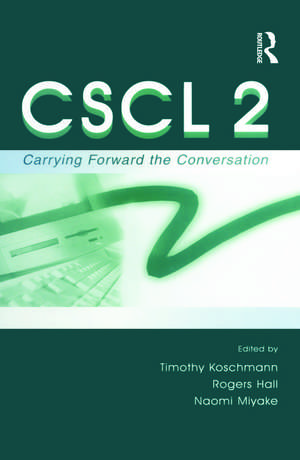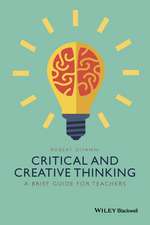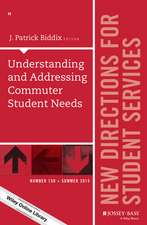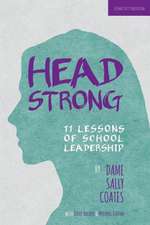Cscl 2: Carrying Forward the Conversation
Editat de Timothy Koschmann, Rogers P. Hall, Naomi Miyakeen Limba Engleză Paperback – mar 2002
Recognizing the long-standing traditions of CSCL work in Europe and Japan, the editors sought to broaden and expand the conversation both geographically and topically. The 45 participating authors represent a range of disciplinary backgrounds, including anthropology, communication studies, computer science, education, psychology, and philosophy, and offer international perspectives on the field. For each chapter, the goal was not only to show how it connects to past and future work in CSCL, but also how it contributes to the interests of other research communities. Toward this end, the volume features a "conversational structure" consisting of target chapters, invited commentaries, and author responses. The commentaries on each chapter were solicited from a diverse collection of writers, including prominent scholars in anthropology of education, social studies of science, CSCW, argumentation, activity theory, language and social interaction, ecological psychology, and other areas.
The volume is divided into three sections:
*Part I explores four case studies of technology transfer involving CSILE, one of the most prominent CSCL projects.
*Part II focuses on empirical studies of learning in collaborative settings.
*Part III describes novel CSCL technologies and the theories underlying their design.
Historically, there has been a certain amount of controversy as to what the second "C" in CSCL should represent. The conventional meaning is "collaborative" but there are many C-words that can be seen as relevant. With the publication of this volume, "conversational" might be added to the list and, in this spirit, the book might be viewed as an invitation to join a conversation in progress and to carry it forward.
Preț: 497.24 lei
Preț vechi: 737.32 lei
-33% Nou
Puncte Express: 746
Preț estimativ în valută:
95.14€ • 99.61$ • 78.73£
95.14€ • 99.61$ • 78.73£
Carte tipărită la comandă
Livrare economică 07-21 aprilie
Preluare comenzi: 021 569.72.76
Specificații
ISBN-13: 9780805835014
ISBN-10: 0805835016
Pagini: 590
Dimensiuni: 152 x 229 x 30 mm
Greutate: 1.09 kg
Ediția:1
Editura: Taylor & Francis
Colecția Routledge
Locul publicării:Oxford, United Kingdom
ISBN-10: 0805835016
Pagini: 590
Dimensiuni: 152 x 229 x 30 mm
Greutate: 1.09 kg
Ediția:1
Editura: Taylor & Francis
Colecția Routledge
Locul publicării:Oxford, United Kingdom
Public țintă
ProfessionalCuprins
Contents: G.M. Olson, J.S Olson, R. Kraut, Series Editors' Comments. Preface. Part I:Case Studies of Technology Transfer. N. Miyake, T. Koschmann, Realizations of CSCL Conversations: Technology Transfer and the CSILE Project. J. Hewitt, From a Focus on Tasks to a Focus on Understanding: The Cultural Transformation of a Toronto Classroom. J. Oshima, R. Oshima, Coordination of Asynchronous and Synchronous Communication: Differences in Qualities of Knowledge Advancement Discourse Between Experts and Novices. F.P.C.M. de Jong, E. Veldhuis-Diermanse, G. Lutgens, Computer-Supported Collaborative Learning in University and Vocational Education. K. Hakkarainen, L. Lipponen, S. Järvelä, Epistemology of Inquiry and Computer-Supported Collaborative Learning. Part II:Empirical Studies of Learning in Collaborative Settings. R. Hall, Collaboration and Learning as Contingent Responses to Designed Environments. D.W. Shaffer, Design, Collaboration, and Computation: The Design Studio as a Model for Computer-Supported Collaboration in Mathematics. R.R. Stevens, Divisions of Labor in School and in the Workplace: Comparing Computer- and Paper-Supported Activities Across Settings. H. Suzuki, H. Kato, Identity Formation/Transformation as a Process of Collaborative Learning of Programming Using AlgoArena. V. Kaptelinin, M. Cole, Individual and Collective Activities in Educational Computer Game Playing. Part III:Technologies for Collaboration and Learning. T. Koschmann, Becoming More Articulate About the Theories That Motivate Our Work. V. Colella, Participatory Simulations: Building Collaborative Understanding Through Immersive Dynamic Modeling. H. Kato, K. Yamazaki, H. Suzuki, H. Kuzuoka, H. Miki, A. Yamazaki, Designing a Video-Mediated Collaboration System Based on a Body Metaphor. P. Bell, Using Argument Map Representations to Make Thinking Visible for Individuals and Groups. G. Gay, R. Rieger, T. Bennington, Using Mobile Computing to Enhance Field Study.
Recenzii
"...an excellent example of a good means-end methodology....This approach gives a good overview of what educators, educational technologists and educational researchers are doing and is well in keeping with the ideas behind collaboration and knowledge construction."
—British Journal of Educational Technology
"The contribution of this book is manifold. 'CSCL 2' provides a crucial link between theory and practice, between innovation and theorizing, between work in CSCL and work in related disciplines. The book essentially delivers what the title promises in that it carries the conversation forward by providing a state of the art account and by advancing our understanding of CSCL."
—Mind, Culture and Activity
—British Journal of Educational Technology
"The contribution of this book is manifold. 'CSCL 2' provides a crucial link between theory and practice, between innovation and theorizing, between work in CSCL and work in related disciplines. The book essentially delivers what the title promises in that it carries the conversation forward by providing a state of the art account and by advancing our understanding of CSCL."
—Mind, Culture and Activity
Notă biografică
Timothy Koschmann, Rogers P. Hall, Naomi Miyake
Descriere
A sequel to the earlier book CSCL: THEORY AND PRACTICE OF AN EMERGING PARADIGM (Koschmann, ed.), selections in this volume not only highlight how the Computer Supported Collaborative Learning (CSCL) field has advanced since publication of the volume,












